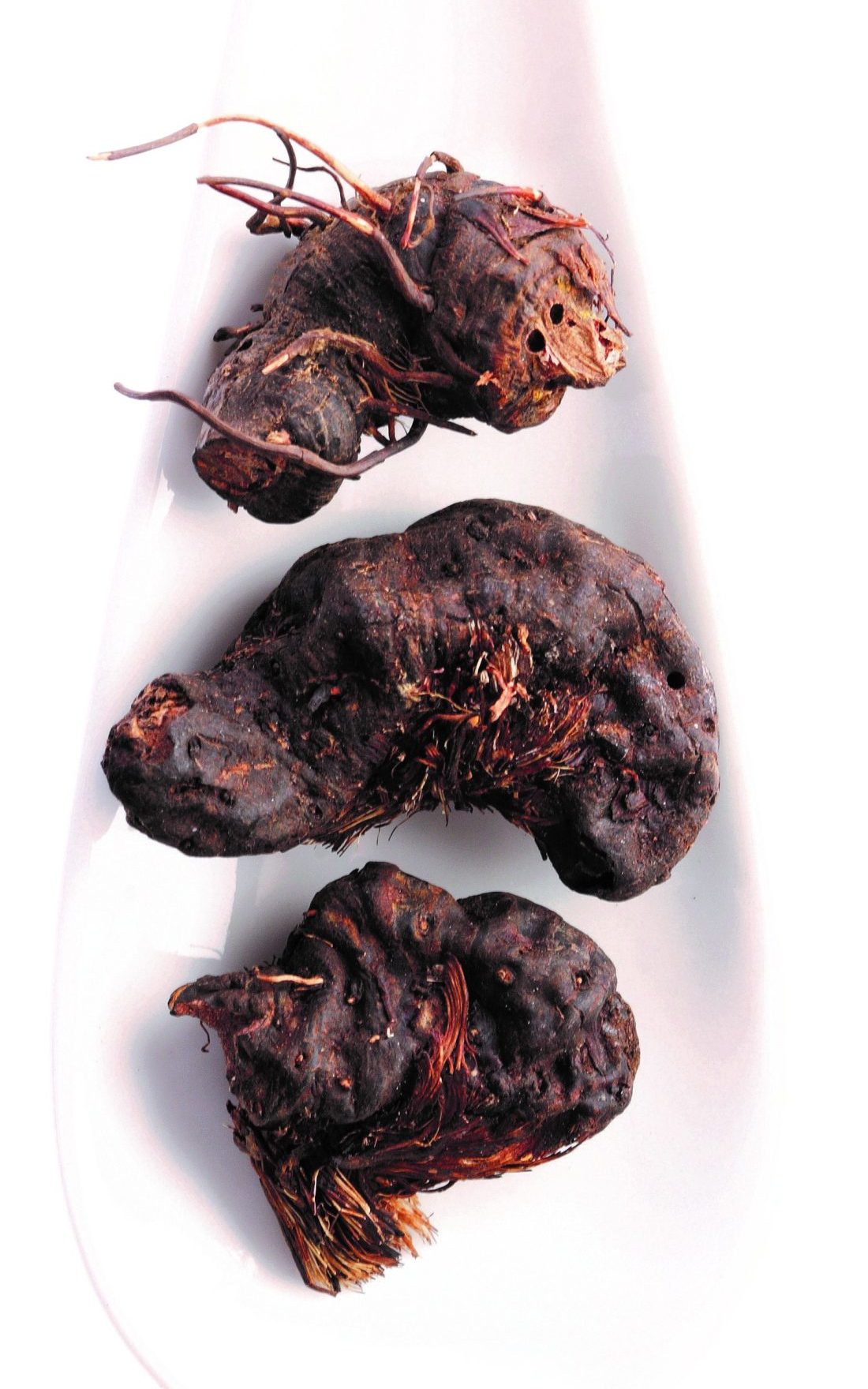Bistort Rhizome (Quan Shen)

What is Bistort Rhizome (Quan Shen)?
Bistort Rhizome (quan shen, 拳参), also known as Snakeroot, comes from the plant Bistorta officinalis (Polygonum bistorta). Typically found in moist meadows, nutrient-rich wooded swamps, wetlands and forest edges, the plant is also cultivated as an ornamental plant and as a vegetable. Its roots, leaves and young shoots can be steamed or boiled for consumption. In particular, Bistort Rhizome is a useful source of food in times of famine.
In Traditional Chinese Medicine (TCM), Bistort Rhizome was first recorded in Ben Cao Tu Jing, 本草图经 (Illustrated Classic of Materia Medica) in 1061 AD. To use the herb medicinally, people gather the rhizomes of Bistort during spring and autumn, wash them with water, have its impurities and fibrous roots removed, cut the roots into pieces, and have them dried under the sun.
Generally, Bistort Rhizome with purple-brown or purple-black outer epidermis and brown-red or light brown-red cross-section is said to be of the best quality.
In TCM, Bistort Rhizome falls under the category of ‘Herbs that clear Heat and relieve toxicity’. Cool in nature, Bistort Rhizome can help individuals with too much Heat in their body, such as those experiencing a Yang Excess or a Yin Deficiency, to restore a harmonious yin-yang balance. Bitter in taste, Bistort Rhizome can cleanse the body by clearing Heat, drying Dampness and promoting elimination via urination or bowel movements. In particular, the herb targets the stomach and the Lungs.
Functions and Benefits of Bistort Rhizome (Quan Shen)
Traditional Chinese Medicine (TCM) shows that Bistort Rhizome has the following health benefits.
Bistort Rhizome can clear Heat and resolve toxicity. This makes it an effective herb in reducing abscesses, resolving phlegm and dispersing clumps. Thus, Bistort Rhizome is often used to treat swellings, abscesses, scrofula, hemorrhoids and febrile seizures. Some also believe that this herb can be used to treat snake bites.
Bistort Rhizome can cool blood to stop bleeding. The herb can relieve syndromes such as hematemesis, heavy menstrual bleeding, bleeding hemorrhoids and red dysenteric disorders. In addition, Bistort Rhizome can clear Heat to relieve convulsions such as spasms caused by calenture as well.
Rich in tannic and gallic acids, Bistort Rhizome can be used to treat wounds. It is useful in treating bleeding disorders, be it internal or external. For example, Bistort Rhizome can alleviate nosebleeds and nasal polyps, In particular, the herb can prevent hemorrhages in the Lungs and stomach.
When made into a decoction, Bistort Rhizome can be used as a mouthwash to treat oral problems like bleeding gums, mouth ulcers, swollen gums, stomatitis, sore throat and loose teeth. When applied externally, Bistort Rhizome also makes a good remedy for skin infections.
Effective in killing intestinal worms, Bistort Rhizome can promote digestive health. From curbing dysentery and diarrhoea to treating bowel complaints and cholera, the herb can relieve digestive problems. Other symptoms that Bistort Rhizome can help to relieve include ulcers, gastritis, enteritis and irritable bowel syndrome. Also, as the herb can promote diuresis, it is an effective herbal treatment for urinary incontinence too.
In addition, Bistort Rhizome can help to alleviate menstrual cramps, curb diabetes and treat jaundice.

How to Use Bistort Rhizome (Quan Shen)
To use Bistort Rhizome as a mouthwash, you can add 1 – 2g of dried Bistort Rhizome to a cup of water, let the mixture stand for about five hours and gargle it in your mouth. This can help to relieve mouth and throat infections.
You can also use Bistort Rhizome as a paste to treat external bleeding, skin infections and improve skin health.
For internal consumption, Bistort Rhizome is available in various supplement forms such as pill and tinctures.
Cautions and Side Effects of Bistort Rhizome (Quan Shen)
Bistort Rhizome should not be used by individuals who do not have Excess Heat in their Kidneys. Pregnant or breastfeeding ladies should stay away from this herb for the time being for safety concerns too. Also, it is contraindicated for external sores caused by yin syndromes.
Excess usage of Bistort Rhizome may cause side effects such as nausea, stomach disorders and Liver disorders. Large doses of Bistort Rhizome may cause irritation of the digestive tract, constipation, nausea and vomiting. Consuming too much of this herb may aggravate existing diseases such as rheumatism, gout, arthritis and kidney stones.
If you are taking other medications, it is best to consume them at least one hour prior to consuming Bistort Rhizome.
We strongly encourage you to consult your healthcare provider before deciding to add Bistort Rhizome to your healthcare routine.
Summary
Here is a summary for Bistort Rhizome (Quan Shen):
- Herb name (Chinese): 拳参
- Herb name (Pin Yin): quán shēn
- Herb name (English): Bistort Rhizome
- Herb name (Botanical): Rhizoma Bistortae
- Origin of species: Polygonum bistorta L.
- Part(s) of herb used: Rhizome
- Geo-specific habitat(s): Shandong, Jiangsu, Hubei, northeastern and north of China
- Taste(s) & Properties: Bitter, astringent; Slightly cold; Administrates the Lung, Liver and Large Intestine Meridians
- Actions: Eases inflammation and muscular spasms due to high fever; Provides relief for bowel movement problems, such as dysentery; Aids in detoxification and reducing swelling for carbuncles, sores, scalds and snake bites
Share this article on
